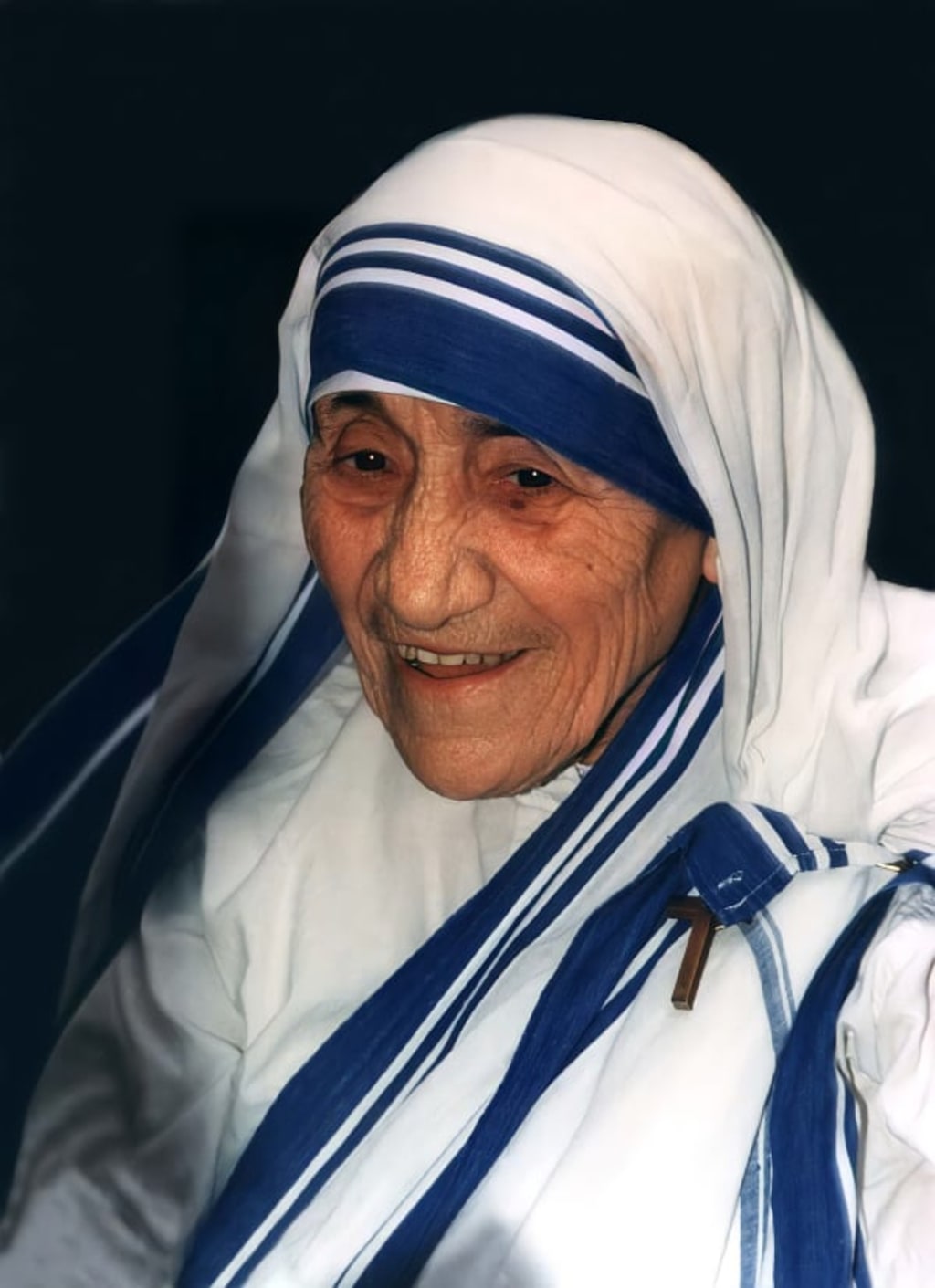EVIDENCE THAT Mother Teresa wasn't a Saint at all!
Before you compare anyone to Mother Teresa, read who she really was

Agnesë Gonxhe Bojaxhiu, was born on August 26, 1910, in Üsküb, the Ottoman Empire (now Skopje, the capital of the Republic of Macedonia). She was baptized on August 27, 1910.
I started finding out about her about a month ago. Very often I hear expressions like, "it's like you're Saint Teresa." And probably not everyone knows the awful truth about this woman. This is why i decided to write about it.
Ask most people what they think about Mother Teresa and they’ll say something vague about what a “good person” she was, how benevolent, self-sacrificing and generally lovely. I have absolute sympathy with this stance; that’s been the pretty consistent thread throughout the news coverage of her, both in life and after death.
The reality- Mother Teresa was a celebrity, with a very well-managed brand.
A 2013 study from the University of Ottawa dispelled the “myth of altruism and generosity” surrounding Mother Teresa, concluding that her hallowed image did not stand up to the facts, and was basically the result of a forceful media campaign from an ailing Catholic Church.
Although she had 517 missions in 100 countries at the time of her death, the study found that hardly anyone who came seeking medical care found it there. Doctors observed unhygienic, “even unfit,” conditions, inadequate food, and no painkillers — not for lack of funding, in which Mother Theresa’s world-famous order was swimming, but what the study authors call her “particular conception of suffering and death.”
“There is something beautiful in seeing the poor accept their lot, to suffer it like Christ’s Passion. The world gains much from their suffering,” Mother Teresa once said.
As much as Mother Teresa was loved and admired around the world, she was criticized. Both during life, after death, and now after canonization. A British journalist made a film about Mother Teresa in which she nicknamed her “the angel of hell.” The journalist accused Mother Teresa of establishing a cult of death and suffering in the homes of the Order of Missionaries of Charity.
Critics include British journalist Christopher Hitchens. He sanctioned the way Mother Teresa adopted poverty as a virtue. "She was not the friend of the poor. She was the friend of poverty. She said that suffering is a gift from God. She spent her life opposing the only remedy against poverty, which is the emancipation of women from the animal stage, which must be reproduced, "said the journalist.
In 1994, Christopher Hitchens dedicated a film to Mother Teresa. It was not a gesture of appreciation.
"All the patients had shaved heads. There were no chairs anywhere. Just thos e mattresses they were lying on. He did not have a garden, a yard. Nothing. And I thought: what is this place? There are two rooms, with 50-60 men in one room and 50-60 women in the other. They were dying. They were not given much medical care. They were not given sedatives other than aspirin. Maybe, if they were lucky, a little Brufen for pain associated with end-stage cancer or other incurable diseases. And I thought: what's the point?They didn't have enough bedding, they reused the needles several times, and you could see some nuns rinsing the needles in cold water. I asked one of them why she was doing this. He told me that's how he cleans them. And I asked her why she doesn't sterilize them, why she doesn't boil water to sterilize those. And he answered me: it makes no sense. We don't have time ", said in the film, a former volunteer, Mary Loudon.
The former volunteer at the dying home in Calcutta says that patients who were not dying also arrived there. They could have been rescued if they had been taken to a real hospital for specialist care and treatment. It was the case of a 15-year-old boy.
"An American doctor told me that he had tried to treat this boy, who had a relatively simple kidney condition, but who had worsened because he had not taken antibiotics. And he needed surgery. He told me: well, they won't take him to the hospital. I asked why. He told me they wouldn't. They won't do it, because if they do it for one patient, they have to do it for everyone else, "said Mary Loudon.
Talking to a woman suffering from cancer who was in terrible pain, Mother Teresa told her "This is the kiss of Jesus. You have approached him through suffering so much that he can kiss you".
Another volunteer who worked with the nuns in the Calcutta home described him as "a scene broken as if from a concentration camp in World War II."
After these revelations, Christopher Hitchens did not shy away from declaring about Mother Teresa that she treated the symptoms of poverty while ignoring its causes and that she never did anything to fight poverty. And this, despite the fact that her order received generous donations from all over the world, with which - say the critics - she could have built hospitals, schools or simply could have created better conditions in the dormitories she administered.
The money received by the Missionaries of Charity is another reason for controversy, because Mother Teresa does not declare any kind of accounting. Everything was done and is done in the name of religion. And also in the name of religion, the order accepted money from controversial personalities, millionaires who made fortunes from frauds or regimes recognized for human rights violations.
The order founded by Mother Teresa now operates in more than a hundred countries and there are voices calling for the money to be accounted for, as other humanitarian organizations, such as the Red Cross and Oxfam, are doing.
In an editorial published in The Guardian, Paul Vallely, a British writer and expert on ethics and religion, talks about the haste with which the Catholic Church raises people to the rank of saints. A rush that leaves no time for such controversies to fade. Because no human being is perfect in life on Earth.
"In the past, the Church let decades, even centuries, pass before declaring someone holy. As time goes on, the candidate's weaknesses are erased from the common memory, leaving in the general memory only the heroic virtue. From Pope John Paul II onwards, the trend has been to accelerate the canonization process. The Catholic Church has made a mistake in this regard. Perhaps Mother Teresa deserves sanctification, but it would have been better if this judgment had been made in a century. "
Does the fact that she had left thousands of people suffer from pain in miserable conditions make her saint?
Please, next time before you compare anyone to Mother Teresa, make sure you know exactly who she really was!!!
About the Creator
Maria Ostasevici
Communication and public relations student, Moldova
Instagram profile: maria.ostasevici;
mother of two awesome Dobermans.
BEST VERSION OF YOURSELF- THAT'S TRULY EPIC






Comments
There are no comments for this story
Be the first to respond and start the conversation.